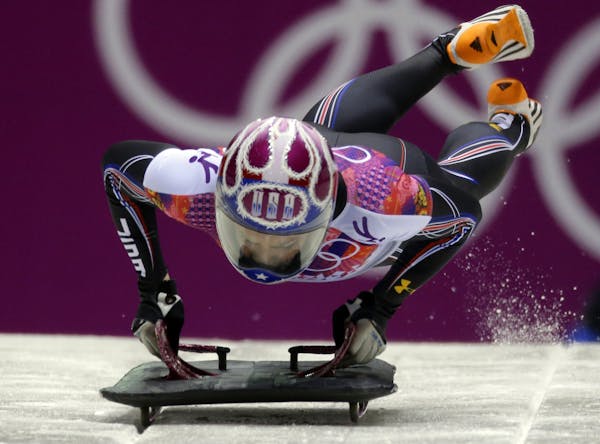SOCHI, RUSSIA – The judges' scores appeared on the television screen as Adelina Sotnikova finished a round of interviews. The Russian teenager already knew she had earned a medal, just not which one.
The scores flashed, Sotnikova smiled. And she then took off running down a corridor in the bowels of the Iceberg Skating Palace.
The 17-year-old Sotnikova turned a corner and found her coach for a warm embrace. Unheralded at the start of these Games, Sotnikova made history and a nation proud Thursday night, becoming the first Russian to claim gold in women's Olympic figure skating.
"I'm so happy because it was my dream to win in Sochi," she said. "I'm so happy that the Olympics were here in Russia because my fans are so supportive. I gave a great gift to my country."
Given the sport's checkered history of judging bias, Sotnikova's victory was greeted with skepticism by a few media members who have followed the sport intimately over the years.
Sotnikova trailed defending gold medalist Kim Yu-na of South Korea by only .28 entering Thursday's free skate program. Sotnikova delivered a rousing performance that ended with a standing ovation from the Russian crowd and the highest scores from judges at 149.95.
Kim went last and skated a clean program, but she executed one fewer triple jump than Sotnikova and earned a mark of 144.19.
Sotnikova's marks allowed her to post the highest combined total of 224.59. Kim took silver with a total score of 219.11 in her final Olympics after announcing her retirement before the Games.
Kim said she didn't see any of the other performances so she didn't know if the judging was fair.
"The scores are given by the judges so I'm not in the right position to comment on it," Kim said through an interpreter. "There's nothing that will change with my words. The most important thing for me is to participate in these Games. This is my last Olympic competition so I'm happy with that."
American Ashley Wagner, who finished seventh, said she did not see either Sotnikova's or Kim's performance, but she criticized her sport's ambiguity in judging.
"This sport needs people who want to watch it," Wagner said. "People do not want to watch a sport when they see someone skate lights out and they can't depend on that person to be the one who pulls through. People need to be held accountable. They need to get rid of the anonymous judging. There are many changes that need to come to this sport."
Sotnikova's victory was stunning because her teammate, Yulia Lipnitskaya, entered the Olympics with far more publicity as a legitimate medal contender. But a night after falling in the short program, Lipnitskaya stumbled once and fell on another jump and finished a disappointing fifth.
Sotnikova kept the crowd engaged throughout her energetic performance. She made her jumps seem effortless as fans clapped to upbeat music. At the conclusion, an emotional Sotnikova covered her face with her hands as fans tossed bouquets of flowers and stuffed animals onto the ice.
"I wanted my performance to be interesting for the audience and I think that I succeeded," she said. "I must admit that I planned after a clean [skate] to show some emotions. I was overwhelmed with these emotions because my performance was so wonderful."
Kim fell short in her bid to become only the third woman to win back-to-back gold medals in this event. She skated a flawless program but settled for second place.
"I felt really relieved that I didn't make any mistakes," Kim said. "A lot of different feelings were coming to me. The biggest feeling was that I felt relieved that it was over."
Italy's Carolina Kostner won bronze while American Gracie Gold finished fourth.
The night belonged to Sotnikova, who made history as an unlikely champion.
"It's my gold medal," she said. "I can't believe it. Two years ago, all of my competitions were very bad. I didn't know if I had what it takes to be successful. Now I know that I do."

